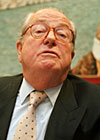

Jacques Chirac (RPR)
Jean-Marie Le Pen (FN)
 |
 |
Jacques Chirac (RPR) |
Jean-Marie Le Pen (FN) |
For the first time in French history, a party of the extreme right
is represented in the second round of a presidential election.
Much has been written by the foreign (and of course French) press since the results of the first round of the 2002 Presidential election became known on April 21. Some of it is accurate, some of it borders on hysteria. To keep things in perspective, here are a few thoughts and facts:
First of all, is Jean-Marie Le Pen really all that bad? The short answer is: unfortunately yes, and most likely worse. The parallels to Austria's J. Haider and Italy's S. Berlusconi are weak: while these politicians may be firmly anchored on the political right, Le Pen's ultra-xenophobic platform goes a lot further than theirs. He is extremely bright, and he is an expert at manipulating people by turning their fear, uncertainty, and anger into political gains. His platform, if one can call it that, is totally unrealistic and truly frightening: French withdrawal from the European Union, abolishment of the Income Tax within 5 years, strong presence of vastly increased police and military (!) forces in the problem areas of major cities, construction of a huge number of new prisons, a war on immigration, a closing of the French borders, and so on. There is already talk of "camps" in which immigrants would be held in "relative comfort" pending their forced return to their respective countries of origin.
It is true that violence has increased in French cities, and it is also true that immigration presents a growing problem few other politicians have been willing to address openly, but finding solutions to long standing issues does not require radical and fascist approaches. So yes, Jean-Marie Le Pen is very bad news, and some concern is clearly in order. Here, parallels with the Germany of the late 1920s and early 1930s are not that far-fetched as any history book not written by lunatics will show. Indeed, such parallels become more and more evident with every Le Pen speech.
Why this sudden surge of the French electorate to the far right? Contrary to the impression one gets when reading the (especially foreign) press and watching international television, there simply is no such surge. Yes, Le Pen got more votes than during the last election in 1995, but it's hardly a surge. Let's look at some figures, keeping in mind that until 2002, French presidential elections took place every 7 years; from now on, it will be every five years:
| 1995 ELECTION | 2002 ELECTION | CHANGE | |||
| Statistic | Nbr | % | Nbr | % | Nbr |
| Regist'd voters | 39,993,954 | 100.0 | 41,194,689 | 100.0 | + 1,200,735 |
| Abstentions | 8.646.994 | 21.6 | 11,698,956 | 28.4 | + 3,051,962 |
| Actual voters | 31,346,960 | 78.4 | 29,495,733 | 71.6 | - 1,851,227 |
| Invalid votes | 882,408 | 2.2 | 997,262 | 2.4 | + 114,854 |
| Valid votes | 30,464,552 | 76.2 | 28,498,471 | 69.2 | - 1,966,081 |
To be eligible to run for the French Presidency, candidates must gather 500 signatures from elected officials (usually mayors of towns). In 1995, there were 9 candidates in the first round. The results were as follows (source: Centre d'étude de la vie politique française):
| 1995 FRENCH PRESIDENTIAL ELECTION | ||||
| Candidate | Party | Tendency | Votes | Score |
| Laguiller, Arlette | LO | Left | 1,615,653 | 5.3% |
| Hue, Robert | PCF | Communist | 2,632,936 | 8.64% |
| Jospin, Lionel | PS | Socialist | 7,098,191 | 23.30% |
| Voynet, Dominique | Verts | Green | 1,010,738 | 3.32% |
| Balladur, Edouard | RPR | Right | 5,658,996 | 18.58% |
| Chirac, Jacques | RPR | Right | 6,348,696 | 20.84% |
| de Villiers, Philippe | MPF | Right | 1,443,235 | 4.74% |
| Le Pen, Jean-Marie | FN | Extr. Right | 4,571,138 | 15.00% |
| Cheminade, Jacques | S&P | Progressive | 84,969 | 0.28% |
In the second round, Jacques Chirac defeated Lionel Jospin 52.6% to 47.4%.
In the first round of the 2002 French presidential election, there were 16 candidates. They achieved the following scores (source: Conseil Constitutionnel Français):
| 2002 FRENCH PRESIDENTIAL ELECTION | ||||
| Candidate | Party | Tendency | Votes | Score |
| Mégret, Bruno | MNR | Extr. Right | 667,026 | 2.34% |
| Lepage, Corinne | Cap21 | Green | 535,837 | 1.88% |
| Gluckstein, David | PT | Left | 132,686 | 0.47% |
| Bayrou, François | UDF | Right | 1,949,170 | 6.84% |
| Chirac, Jacques | RPR | Right | 5,665,855 | 19.88% |
| Le Pen, Jean-Marie | FN | Extr. Right | 4,804,713 | 16.86% |
| Taubira, Christine | PRG | Left | 660,447 | 2.32% |
| Saint-Josse, Jean | CPNT | Spec. Interest | 1,204,689 | 4.23% |
| Mamère, Noël | Verts | Green | 1,495,724 | 5.25% |
| Jospin, Lionel | PS | Socialist | 4,610,113 | 16.18% |
| Boutin, Christine | FRS | Right | 339,112 | 1.19% |
| Hue, Robert | PCF | Communist | 960,480 | 3.37% |
| Chevènement, J.-P. | MDC | Left | 1,518,528 | 5.33% |
| Madelin, Alain | DL | Right | 1,113,484 | 3.91% |
| Laguiller, Arlette | LO | Left | 1,630,045 | 5.72% |
| Besancenot, Olivier | LCR | Left | 1,210,562 | 4.25% |
These results are the basis for the sensational second-round pairing of Chirac and Le Pen. It is the first time in French history that a member of an extreme-right party makes it to the second round of a presidential election, and the news literally sent a shock wave around France. The outcome everyone expected was a second round between Chirac and Jospin. There are many possible reasons for the second-round absence of Jospin and the presence of Le Pen. Here are a few:
Be that as it may, one cannot honestly speak of a surge of the extreme right. Le Pen's score has evolved from 15% to 16.86%, and while this is scary enough, it represents, after all, only a growth of 233,575 votes, or 0.82% of all valid votes cast. Jospin actually trailed Le Pen by fewer votes than that: 194,600 (or 0.68% of all valid ballots). Worrisome? Definitely. A surge? Hardly.
The second round promises to be interesting. As I write these lines (on Saturday, April 27, 2002), there are thousands and thousands of people all over France demonstrating against the presence of the "Front National" in the second round of the elections. Leaders from all major religions have called for voting against Le Pen (and thus supporting Chirac), as have practically all trade unions and non-extremist political parties. In many parts of France, mayors who have provided Le Pen with the signatures he needed to be eligible for the presidential race are coming under increased pressure from their constituents.
If people actually go to the polls (and given the fear many have of Le Pen, there is a good chance that they will), we should witness a resounding defeat of Le Pen and his "Front National". A victory of the extreme right is simply unthinkable in a country that prides itself on its respect for, and solidarity with, other cultures and peoples. Le Pen's party and political goals are incompatible with the ideals and values France has historically stood for. Indeed, they are incompatible with any decent human thought and behavior.
Perhaps all this is merely wishful thinking on our part. We shall know a week from tomorrow: the second round of the 2002 French presidential election takes place on Sunday, May 5. This page will be updated with the results shortly afterwards.
Today, the French voters have soundly defeated Le Pen: Jacques Chirac obtained 82.5% of the votes, and Jean-Marie Le Pen (who had stated that he would consider anything less than 30% a failure) ended up with 17.5%. To be sure, these are preliminary results, but the final figures should not be off by more than a percentage point or so. In the first round, the candidates of the two extreme right parties had obtained 16.86% (Jean-Marie Le Pen) and 2.34% (Bruno Mégret), respectively. From the looks of it, the extreme right did not manage to hold on to this combined score of 19.2%. There were fewer abstentions (estimated at roughly 20% tonight; again, we will have to wait for more reliable figures), as opposed to 28% in the first round), so with respect to the first round, the extreme right did get more votes but fewer percentage points.
Between the two rounds, there was an amazing rally against the extreme right. The result indicates that all parties except the FN and the MNR voted for Chirac, even the communists and the socialists. It is clear that Jacques Chirac cannot take his landslide victory as a personal vote of confidence; indeed, many, if not most, voters cast their ballots against Le Pen and not for Chirac. The president will now face the difficult task of addressing some of the issues which caused Le Pen to get as far as the second round. The next crucial test will be the legislative elections in early June. The political left, which supported Chirac as the lesser of two evils (battle cry: "vote for the crook, not the fascist!"), will want to reassert itself, and the Front National will look to increase its influence.
But for today, we breathe a sigh of relief. Democracy, a system of government that contains the seeds of its own destruction by design, has prevailed. While we did not consider the possibility of a Le Pen victory for a moment, it was important that he should be defeated by a substantial margin, which turned out the be the case. As we see it, France is better off for it.
Home | Site Info | Family | The Area | Trips | France | Work | Rants | Photography | Odds & Ends
This page was last modified on October 13, 2002
Send feedback about this page to feedback@kiechle.com
https://www.kiechle.com/rants/fascism/fascism.htm
All contents © 1999-2026 The Kiechles